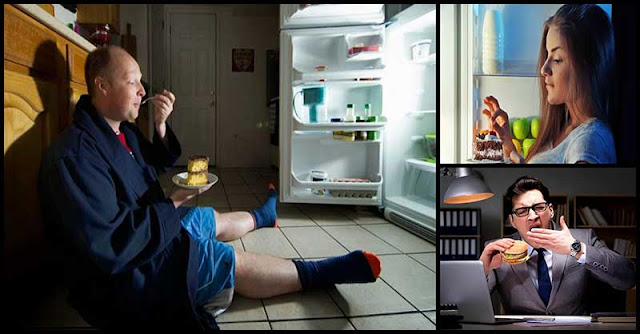Midnight snacking may not be of any particular problem if done occasionally. However, if you make it as a habit along with excessive quantities and eating particular foods, it may cause serious long-term effects on your health and overall well-being.
Namni Goel, the lead author of a research conducted by the Perelman School of Medicine at the University of Pennsylvania, says that:
“Eating later can promote a negative profile of weight, energy and hormone markers – such as higher glucose and insulin, which are implicated in diabetes, and cholesterol and triglycerides, which are linked with cardiovascular problems and other health conditions.”
Detailed Reasons Why You Should Avoid The Habit Of Eating Late At Night
Unhealthy Weight Gain
If you eat meals at odd hours, your body’s circadian rhythm (body clock) can be thrown out of sync thereby causing hormonal imbalances, affecting sleep, and resulting in weight gain. These effects may be because of the poor food choices (such as ice cream and chips) late-night eaters tend to make and we all know that our metabolism is not that effective at burning calories during night time.
Poor Digestion
Suffering from acid reflux and heartburn? Then maybe, you should try to have regular meal timings.
Late dinner has been found to be significantly linked to gastric issues This is because of the excessive acid in the stomach which is caused by poorly digested food. Due to this, it is recommended that you should eat your dinner regularly at an earlier time for you to be able to have a leisurely walk and avoid going straight to bed as it can trigger acid reflux and other gastroesophageal reflux diseases (GERD) symptoms.
It Affects Your Memory And Concentration Levels
Eating late at night is bad for your brain health. Experts found that irregular eating patterns affect the circadian system which in turn affects the brain’s ability of concentration, learning, and memorizing as well as increasing a person’s risk of depression and anxiety.
Increased Blood Pressure
Diabetes and heart diseases are some of the serious effects of the misaligned body clock. According to studies, hypertension or high blood pressure and high blood sugar levels are directly associated with having late dinner at night (the ideal time is 7 p.m.).
It Is Linked To Eating Disorders
You may have deeper problems if you crave for bedtime snacks night after night. It can possibly be due to a condition called NES or Night Eating Syndrome which is found to significantly associated with eating disorders such as binge eating.
Disturbed Sleep
According to studies, eating late at night causes people to have a disturbed sleep cycle since they tend to sleep later. It was also found that midnight munchies can cause confusing dreams at night.
An investigation in 2015 had revealed that the gastric discomfort caused by the snacks makes the participants more prone to bizarre dreams.
So, How To Stop Eating Late At Night?
Here are some helpful tips on how to stop eating late at night.
- Make sure you eat balanced dinner – consisting of healthy proteins, fats, and carbohydrates by 7:00-7:30 p.m. in order for you to keep satiated and give you better control over cravings until you fall asleep.
- Avoid buying junk foods so that you won’t go looking for it.
- If you are going to bed well past 10:00 p.m., you may enjoy a couple slices of apple or a few almonds an hour before bedtime to keep your stomach from rumbling when you’re trying to fall asleep.
- Have a relaxing, calming bedtime routine every day to minimize the stress that only worsens your food cravings for comfort foods.









